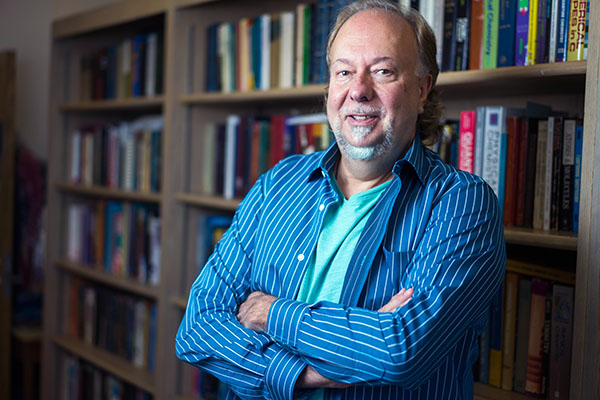By David Goll

Chemistry Professor Bradley Stone has been named the 2017 Bobby Jackson Award for Jazz Programmer of the Year by the weekly online industry publication, JazzWeek. (James Tensuan/San Jose State University)
Even as a toddler, Dr. Bradley Stone had an uncanny ability to choose music to entertain visitors to his parents’ Chicago home.
“When I was one and a half years old, my mother would ask friends and relatives to make a musical request,” Stone said. “They would look at her and say, ‘How can he do that when he’s so young?’ She would just laugh and say, ‘Go ahead. He can do it!'”
It was an early indication of what would become a lifelong passion and avocation. This past August, a very grown-up Stone observed the 32nd anniversary of his hire date at SJSU. But he is not a professor in the School of Music and Dance or even the Department of TV, Radio, Film and Theatre. He has been professor of Chemistry at SJSU since the 1985-86 academic year and served a stint as department’s chair between 2003 and 2012.
Along with all of his accomplishments in his chosen academic field, Stone takes great pride in winning the 2017 Bobby Jackson Award for Jazz Programmer of the Year by the weekly online industry publication, JazzWeek. It’s the third time the San Jose State professor has won the honor (tenth time overall as Jazz Programmer of the Year), this time for his weekly jazz music program titled “The Creative Source” available through the SoulandJazz.com website, based in the United Kingdom. Stone records the show, surrounded by his extensive collection including tens of thousands of CDs, in the radio studio he built in his Gilroy home. Nominations for the award come from jazz artists, record label executives, promoters, publicists and other programmers.
“It’s extremely gratifying to win this award,” said Stone, who received his award in the Internet and Non-Terrestrial category during an August ceremony at San Jose’s Hotel De Anza. “It’s wonderful to be recognized for your work by other members of the jazz music family. I like to think I’m recognized as a good programmer in the industry, and that others look to me for my playlists.”
Jackson, legendary Cleveland-based jazz programmer, became a good friend of Stone’s after the pair met years ago at industry gatherings. Jackson introduced Stone to Brian Hurst of SoulandJazz.com via a phone call just days before he died suddenly at age 57 in December 2013.
“I felt it was meant to be,” Stone said of the collaboration with Hurst at SoulandJazz.com.
Hurst, CEO of SoulandJazz.com, said Stone’s weekly selection of music — emphasizing jazz fusion and progressive jazz — is marked by his devotion to providing a platform for new artists, premiering music that would otherwise “fall between the cracks.”
“His accolades over the years suggest he’s a man to be both respected and trusted and in that word trust, you can begin to understand why people would consider his music selection to become the starting point to discover new artists, new styles, new sounds,” Hurst said.
It is motivated not only by Stone’s love of this American-born musical genre but of a variety of musical styles, including rock. He played in a rock band during his undergraduate college days at the University of Illinois, Chicago in the 1970s, then had his first disc jockeying job at campus radio station WQAX while pursuing a Ph.D. in chemical physics at Indiana University, Bloomington in the 1980s. He later became jazz music director at radio station KUCI while a postdoctoral research associate at the University of California, Irvine.
“I’ve been a music head my entire life,” Stone said.
He further honed his radio skills and expanded his knowledge of jazz and other musical styles just a week after arriving at San Jose State. That was when he launched a Saturday deejay gig at campus radio station KSJS that lasted from 1985 to 1997, then again from 2001 to 2012. He served as the station’s jazz music director for virtually that entire time, as well as a faculty adviser to students in the university’s Department of TV, Radio, Film and Theatre, before stepping down in early 2013.
“I have mentored literally thousands of students at KSJS,” Stone said of the job he did teaching on-air and behind-the-scenes skills, as well as radio station management.
William Reckmeyer, professor of Anthropology who retired earlier this year after 40 years at San Jose State, met Stone through yet another activity that has become a passion for the chemistry professor. Stone was named a Fellow in SJSU’s Salzburg Program, a global education program that sends several students and faculty members to study in Austria or Germany since 2005. Reckmeyer, instrumental in designing and implementing the European program, said he has become a big fan of Stone’s enthusiasm for the Salzburg program and his impressive record of accomplishments in academia and jazz music programming.
“He was instrumental in helping KSJS win national awards for being the best collegiate jazz station, besides all of the individual awards he won for programming,” Reckmeyer said. “I’m a rock ‘n roll guy, and I know a bit about jazz, but when you have a good friend, you take an interest in what they love. Brad is so knowledgeable and passionate about jazz.”
As Stone is, too, about chemistry. He developed an interest in the sciences at age 6, becoming fascinated by chemistry, physics, astronomy, entomology and geology as a youngster. Though focusing his academic career on the interdisciplinary field of chemical physics, Stone has also worked in molecular astrophysics, astrochemistry, biomedical engineering, computational fluid dynamics, forensic chemistry, non-linear optics and spectroscopy.
When asked if there is much connection between the world of hard scientific disciplines and the fluid, improvisational, creative nature of jazz, Stone draws strong parallels.
“I would say there is the mathematical connection,” he said. “Music theory definitely has a mathematical basis. The mathematical relationship between frequencies of notes is the basis for harmony. So, I don’t think it is particularly surprising that a large percentage of scientists are also musicians, at least on some level.”






